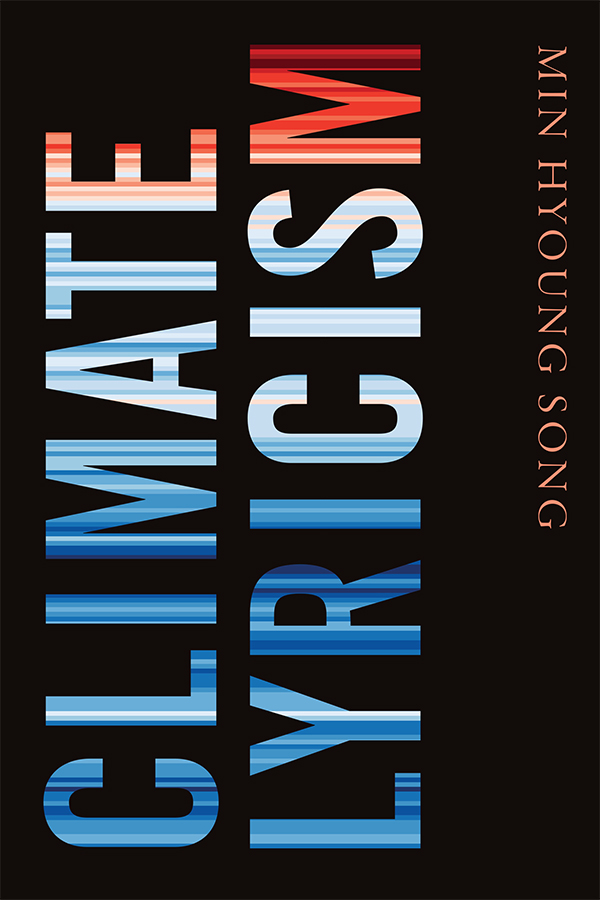The Book
Climate Lyricism
The Author(s)
Min Hyoung Song

Min Hyoung Song’s book “Climate Lyricism” offers a fresh perspective on understanding and addressing climate change. Song recognizes the challenges that readers face when attempting to give climate change sustained attention in grappling with the enormity of the situation and feelings of helplessness and being overwhelmed. The world is literally on one’s shoulders. He recognizes that various obstacles, such as a deficit of power science, can make it difficult for people to grasp the link between worsening ecological processes and their own economic precarity or cultural dislocation. Furthermore, the highly complex organization of human labor has had a huge impact on transforming the physical world, allowing for more efficient production and distribution of goods, leading to increased economic growth and development. In turn, this type of organized labor has enabled people to access resources that were previously inaccessible, thus driving global progress. Song cites Amitav Ghosh’s argument, which has become prominent in public discourse, to say that the unequal distribution of resources and knowledge regarding environmental issues has led to a lack of understanding of such a nuanced phenomenon among those without adequate access. Song suggests that instead of tackling climate change individually, we must collaborate with the objects and things around us, as they possess an animacy that can guide our actions. He points to, climate lyricism, in particular, as a form of writing that uses poetic language to express the emotions and experiences associated with climate change and combines elements from different genres such as poetry, essays, music lyrics and stories to create an emotionally powerful narrative. Therefore, these forms of writing can provide an opportunity for the marginalized to recognize the connection between worsening ecological processes and their own financial or social displacement, as they are more able to capture complex emotions which may be difficult for scientific arguments alone to convey. They can also help all of us reflect on how our actions today can shape the future in terms of environmental sustainability, thereby encouraging us to collaborate with the objects and things around us and become aware of our role in shaping the environment.[1]
This book is significant because it sheds light on how climate change impacts different communities and cultures, including Asian Americans. As an academic in Asian American studies, Song draws on his expertise in race and ethnic studies to provide references to other Asian American scholars who have addressed climate change and even cites famed Asian American author, activist and philosopher, Grace Lee Boggs, to insist that thinking should be separated from doing. He emphasizes the need for solidarity among different ethnic groups when tackling environmental issues such as climate change – a characteristic of the Asian American movement. Song hopes that by appreciating nature’s beauty, readers will be more motivated to take action against this pressing issue.[2]
While “Climate Lyricism” has many strengths, some critical readers are left with a few unanswered questions. Although Song emphasizes understanding how individual actions, collectively, can have a significant impact on the environment, he fails to provide more concrete suggestions for taking action against climate change. Min Hyoung Song is thought-provoking in his exploration of climate change on various communities and cultures and calls for readers to form an emotional connection with nature to motivate them towards taking action. Additionally, despite calling for mass collective action, the language used in the book may not be accessible to a wider audience. Overall, “Climate Lyricism” provides valuable insights into how climate change affects different communities and cultures, including Asian Americans. It encourages readers to appreciate nature’s beauty and take action against climate change while emphasizing the need for solidarity among different ethnic groups when tackling environmental issues. This book is particularly relevant to Asian Americans as it urges them to play an active role in addressing this global challenge.
[1] Song, Climate Lyricism, 1–2, 11.
[2] Song, 2–8.
About the Reviewer
Ang Li is a bi-lingual ABD Ph.D. student at the University of Texas at Dallas (UTD). He has presented at a few conferences and is a research assistant for the Center of Asian Studies at UTD. He is currently working on a dissertation involving women missionaries who went to China.

0